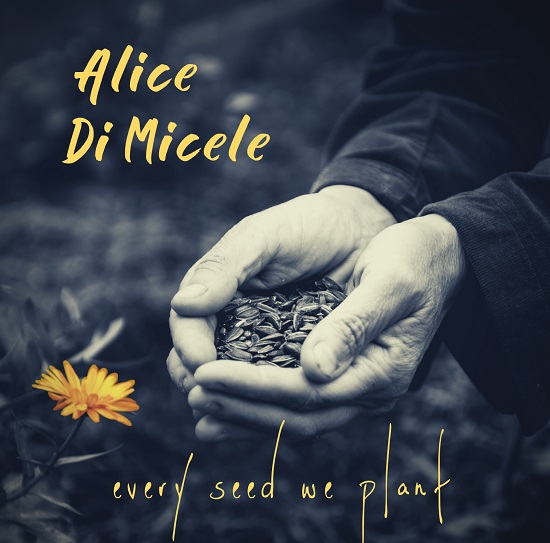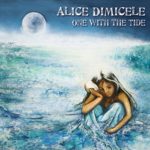
Three decades in the business and fifteen albums is quite an impressive achievement. ‘Every Seed We Plant’ is the next step; album sixteen. The good news is that Alice’s creativity is undimmed after that time and her voice is still as powerful as ever over the whole of its wide range. The album displays a wide range of styles from the slow country waltz feel of ‘Sweet Elaine’ to the soulful rock of the album’s opener ‘For Granted’. The styles may vary but there are several themes related to the last two years running through the album that create a sense of unity across the piece. Apart from the obvious references to grief, there’s anger, redemption, joy and a sense of rebirth. The album’s opening and closing songs both have references to planting and nurturing.
The two songs that best demonstrate the emotional range of the album are ‘Dispatch’ and ‘Sweet Elaine’. ‘Dispatch’ is a very angry song about the real events that led to the killing of a black retired Marine, Kenneth Chamberlain, in his home in White Plains, New York. The story’s told from the point of view of the dispatcher responsible for sending the police to activations of LifeAid medical alarms, who was called by Chamberlain asking the police to withdraw. It’s a very angry song about something that’s still way too common in America today, told in a very compelling way. ‘Sweet Elaine’ is a slow country-rock waltz telling the beautiful story of a woman and a dog who profoundly change each other’s lives. The slight vibrato on the vocal and the Eagles-style vocal harmonies create a happy and relaxed feel that perfectly matches the positive narrative.
The album opens with ‘For Granted’, a soulful rock groove in a seventies style that evokes Maggie Bell or even an in-tune version of Janis Joplin. It nods in the direction of Etta James’s ‘I’d Rather Go Blind’ (the unnecessary cover of choice for many a second-rate blues-rock band) with a rock band line-up including organ and piano (with the obligatory triplets of course). Alice’s voice is so versatile that there are comparisons to be made with Joni Mitchell, Rickie Lee Jones and many others. The band arrangements are equally diverse, with ‘Jersey’, not surprisingly, having a hint of the E Street Band as it takes a hammer to the New Jersey stereotypes that Alice has probably heard for most of her life.
As a whole, the album takes a journey through the various stages of recovery from the pandemic and its associated woes from grief to rebirth, with the final two songs, ‘Sweet Elaine’ and ‘’Every Seed’ looking forward to a more hopeful future. It’s a lovely example of creating beautiful art from unpromising raw materials.
‘Every Seed We Plant’ is out now in the UK on Alice Otter Music (AO116).
Here’s the video for the title song:
 Alice DiMicele’s a highly-principled songwriter. She creates songs about the things that matter to her, whether it’s the environment, land rights of indigenous peoples or being in a relationship with an alcoholic. To these powerful themes she adds a wide range of musical stylings to create nine songs (nine song albums, is that a thing now?) that demonstrate a wide range of influences while retaining an organic, rootsy feel. If that wasn’t enough, she has a tremendous voice with a huge range and the ability to work across different styles. All of this and a John Lennon cover to close out the album. Sounds good to me.
Alice DiMicele’s a highly-principled songwriter. She creates songs about the things that matter to her, whether it’s the environment, land rights of indigenous peoples or being in a relationship with an alcoholic. To these powerful themes she adds a wide range of musical stylings to create nine songs (nine song albums, is that a thing now?) that demonstrate a wide range of influences while retaining an organic, rootsy feel. If that wasn’t enough, she has a tremendous voice with a huge range and the ability to work across different styles. All of this and a John Lennon cover to close out the album. Sounds good to me.
As much as I love the elemental, environmental themes of the album, the song that I want to hear again and again is “Lonely Alone”, a poignant ballad that tells the story of life with an alcoholic. It all fits together perfectly, from Alice’s soulful delivery (reminiscent of Etta James’ “I’d Rather Go Blind”) to the Steve Cropper-like crystal-clear guitar solo and even the prominent accordion; there’s not a note out of place. It’s followed immediately by the uplifting “Waiting” with its South African rhythms and a bit of steel pan to add a Caribbean carnival vibe to create a feeling of joy that throws the stark environmental messages into sharp contrast.
Apart from these two songs, the overall sound of the album has hints of The Band (maybe it’s the Hammond B3 and slide guitar) and some interesting string arrangements (on “The Other Side” and “Seeds”) and a lovely stripped-back version of the final song, the album’s only cover. It’s fair to say that “Imagine” isn’t my favourite song, but Alice strips away the overblown elements of the original and, with some delicate finger-picked guitar, harmony vocal and cello; can you believe it, “Imagine” with a cello solo?. It’s only a delicate touch, but the call and response of ‘brotherhood of man’ and ‘sisterhood of woman’ transforms the song completely.
“One with the Tide” is an album full of seemingly effortless performances, thought-provoking lyrics, startling contrasts and superb vocals. Favourite song? Has to be “Lonely Alone” with the perfect soul combination of a sparse arrangement, melancholy theme and Alice’s soaring vocal.
“One with the Tide” is released on Friday January 19 on Alice Otter Music (AO114).


